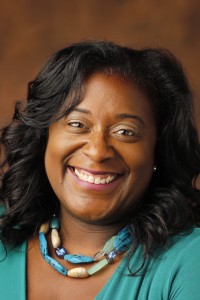Candidate for AMTE Board Member-at-Large
Nicole M. Joseph
Vanderbilt University
Assistant Professor of Mathematics Education

Past Participation and Involvement in AMTE and/or AMTE Affiliates(s)
I have been a member of AMTE for the last 5 years. I have attended conferences, both as a participant and a presenter. A session that I attended back in 2012 became the inspiration and catalyst for my recent book on Interrogating Whiteness: White Faculty’s Commitment to Racial Consciousness in STEM Classrooms (2016). Several of the math educators in that particular workshop were discussing their desire to go deeper into their equity and social justice work, but were not sure how. Since Whiteness work in mathematics was a part of my research interests, I responded to this need by publishing the edited volume, which is an anthology of narratives of White math and science faculty sharing their deeply personal and reflective processes of doing whiteness and racial consciousness work. This is the real work I think should be done to really transform systems. I am grateful to AMTE for this inspiration because it has sold over 300 copies so far and is being well received. I have also reviewed conference proposals, sit on the Equity Committee, and was a STaR Fellow in 2013-2014.
What qualities do you bring to the AMTE Board Member-at-Large Position?
I have experience and skill in cognitive coaching, which is a type of questioning one engages in when very sensitive issues are the focus (i.e. race, whiteness, white supremacy, racism, etc.). I have also had training on courageous conversations. These skills have proven effective and transformative when having dialog with mathematics teacher educators, pure mathematicians, mathematics education researchers, etc. about the significance of equity issues. I am honest. I have integrity, and I am not afraid of conflict. I have developed strategies over the years that support both my own mental health in doing this challenging work (this work is both deeply personal and community-oriented). I have learned to work with just about anyone because it is going to take ALL of us, as a mathematics education community to dismantle inequities. Overall, while my current work is about examining and understanding the experiences of Black girls and women in mathematics, this said work informs math teacher education because it provides insights into what pre-service and in-service math teachers might think about as they aim to achieve excellence in their teaching of underrepresented students. My broader work on structures and the interrogation of whiteness in mathematics (social context, teacher and school level, etc.) can also inform leadership-level conversations because the reality is that most of our math teachers are White. Math teacher education needs to continue to evolve and think innovatively and transformatively about how we might do things differently to achieve our ends related to equity and social justice.
I am committed to math teacher education. I have taught several content and methods courses over my 6 years in the academy, served as an instructional coach for four years while in the K-12 system, and also taught middle school mathematics for five years. I have supervised pre-service math teachers, and I have conducted my own empirical work examining math teacher practices that appear effective for Black girls. I have received numerous invitations to participate in math teacher education conversations, including the Mathematics Teacher Education-Partnership, an organization comprised of 39 teams across 31 states, including 103 universities, university systems, and community colleges; 142 K-12 schools and school districts; and several state departments of education, education consortia and other education-focused organizations, all working collaboratively to redesign secondary mathematics teacher preparation programs. This year I was invited to be a conference reactant to the opening equity panel and the close out session. The proceedings of my talks can be found here. Finally, I am an African American woman and will bring an intersectional perspective. What will not happen however is the "speaking for the entire race" position. I am coming to contribute to the discourse AMTE is having about the health of the organization and how to do their work at the level of excellence and transformation. I enjoy working with my colleagues to figure out hard issues and that includes my expectation of the fellow board members to do their due diligence. I cheer and challenge my colleagues in ways that help us get the work done.
What three goals do you think AMTE should make a priority?
- Commit to really understanding its position on equity and social justice and be bolder about that position. While AMTE may not view itself as a political entity, the fact of the matter is that, AMTE is by default. Math teacher educators look to this organization for answers and ways to do equity work well. We need to take this work to the next level.
- Develop a more coherent linkage of its varied members. How do the policy people connect with K-12 math teachers? How do elementary pre-service teachers connect with researchers? Making this more visible and coherent will probably increase membership participation.
- Support math teachers to better realize their role as identity workers (cultural and disciplinary) as they teach math content and processes; especially in thinking about the implementation of the new AMTE Standards in Section C.
